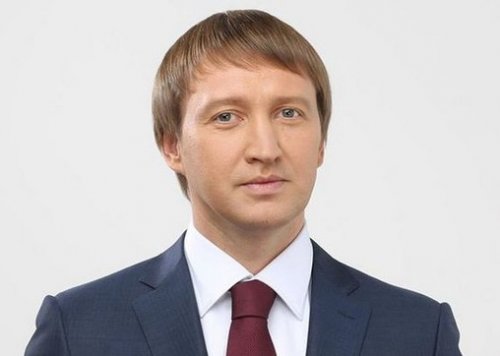Taras Kutovoy
For some, the fertile Ukrainian land is a means of production, while others see it only as a commodity for speculation in the real estate market and collateral for financial scams. Unfortunately, Ukraine will continue to buy Polish potatoes and Chinese apples for a long time, as long as its agriculture is managed by costumed patriots and lobbyists of oligarchic corporations. Over the past three years, the country has had three ministers of agricultural policy, and Ukrainians remember all of them only for political and corruption scandals. How long will the current head of the department, Taras Kutovoy, stay in his seat? It depends on how diligently he fulfills the wishes of the people who appointed him there…
Soros’s Child
Future Ukrainian minister Taras Viktorovich Kutovoy was born on February 25, 1976 in Kyiv, to an intelligent family of mathematics teachers. His father, Viktor Aleksandrovich, taught formulas to students of the Kyiv Institute of National Economy (now the V. Hetman National Economic University), and his mother drew functions for students of the Kyiv Physics and Mathematics School No. 145. They instilled an interest in numbers and calculations in their children: two sons and three daughters. Taras Kutovoy studied at his mother’s school, which in the early 90s was transformed into a lyceum and attracted the interest of the International Renaissance Foundation, one of the most famous and largest projects of George Soros. The foundation took the lyceum under its financial guardianship (8 of its teachers became Soros scholarship holders), which effectively saved it from collapse, since many of the lyceum’s teachers were planning to quit and look for better jobs. At the same time, the most promising students of the lyceum were taken under the wing of the fund.
However, by that time, having received a certificate with honors in 1992, Taras Kutovoy decided to enroll in the newly opened Institute for Training of SBU Personnel (now the SBU Academy), which he graduated in 1997 – again, with honors. He never talked about the specialty he received there, but it was in economics. However, work in the SBU did not attract the young officer, although at that time it was considered very prestigious and promising. Perhaps not without his mother’s connections, in 1998 Taras Kutovoy left the Service and got a job in the Vozrozhdenie Foundation branch as a deputy chief auditor of projects and programs of regional branches. This work determined the future political and economic outlook of Taras Kutovoy, who became a supporter of the pro-Western “open society” and “liberal economy”. However, whether he really shared these ideas, or simply assented to his employers, is unknown.
In the same 1998, Taras Kutovoy received a diploma from the Kyiv National Economic University (where his father taught), becoming one of the youngest holders of two higher educations in the country. And in 1999, he received the position of financial director of the newly created All-Ukrainian Foundation “Step by Step” – a joint project of the Soros Foundation “Renaissance” and the American “Child Development Center”, focused on working with children in the field of school education. The actual appointment as the chief treasurer of the foundation indicated that Taras Kutovoy quickly earned a very high level of trust in the structures of Soros’s financial institutions.
The career of the “Soros favorite” Taras Kutovoy was growing successfully. In 2002, he received his third higher economic education at the Kiev branch of the International Institute of Management. In fact, it was a diploma from Soros, which was no longer surprising. Indeed, the International Institute of Management in Kyiv was opened in 1990 on the initiative of the Canadian Bohdan Gavrilyshyn, who a year before had opened the Soros “Renaissance” foundation in Ukraine.
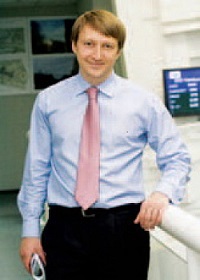 Although during 2003-2004 Soros funds actively financed the preparation of the “orange revolution” through a host of public organizations and media, Taras Kutovoy did not get involved in politics and focused entirely on the economy. In 2004, he unexpectedly left the chair of the financial director of the “Step by Step” foundation, remaining a member of its supervisory board, and sat in the chair of the financial director of the ZAO “Investment Company XXI Century”. Kiev residents knew it as the company of the oligarch Lev Partskhaladze (Read more about him in the article Lev Partskhaladze. The Glamorous Builder of Kyiv Politics), who was involved in the purchase of land plots in the capital and their development, the owner of the Elita-Service group, the Shvidko chain of snack bars, the Tsarskoye Selo, Korona-Club and Pervak restaurants, and the Globus and Kvadrat shopping centers.
Although during 2003-2004 Soros funds actively financed the preparation of the “orange revolution” through a host of public organizations and media, Taras Kutovoy did not get involved in politics and focused entirely on the economy. In 2004, he unexpectedly left the chair of the financial director of the “Step by Step” foundation, remaining a member of its supervisory board, and sat in the chair of the financial director of the ZAO “Investment Company XXI Century”. Kiev residents knew it as the company of the oligarch Lev Partskhaladze (Read more about him in the article Lev Partskhaladze. The Glamorous Builder of Kyiv Politics), who was involved in the purchase of land plots in the capital and their development, the owner of the Elita-Service group, the Shvidko chain of snack bars, the Tsarskoye Selo, Korona-Club and Pervak restaurants, and the Globus and Kvadrat shopping centers.
The main business of ZAO XXI Vek was development – that is, resale of real estate with an increase in its value through modification, reconstruction or construction. The main guarantee of the success of ZAO XXI Vek was the acquisition of land plots in the capital at symbolic prices due to the direct connection of the owners and managers of the company with the Kyiv city government, since the head of ZAO XXI Vek was a deputy of the Kiev City Council in 2002-2006. In addition, Lev Partskhaladze had access to all government offices, including the Secretariat of the President of Ukraine.
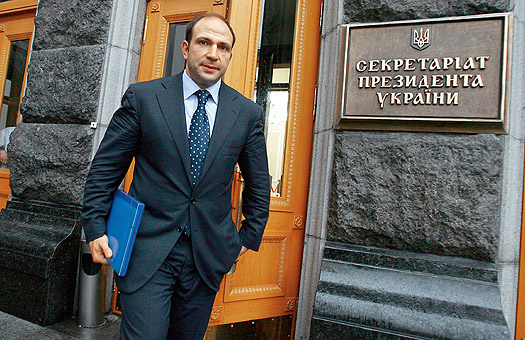
Lev Partskhaladze
It seemed strange why Taras Kutovoy suddenly left the “Soros empire” and went into private business, but some details about the work of ZAO XXI Vek provide an exhaustive answer to this. Almost simultaneously with Kutovoy, Yaroslav Kinakh, a Ukrainian of Austro-Canadian origin, came to the company, who arrived in Ukraine in the early 90s as a representative of the European Bank for Reconstruction and Development (EBRD). He was called a person associated with Soros’s international business (not charitable foundations, but business). At the same time, Yaroslav Kinakh took the position of the head of the company “XXI Century Investments” registered in Cyprus, to which the profits of ZAO XXI Vek went. Thus, Partskhaladze “pushed through” the purchase of land plots in Kyiv and the region and was engaged in development, and Yaroslav Kinakh was engaged in the withdrawal of profits to a Cyprus offshore – not without the assistance of financial director Kutovoy. But in addition to this, Kutovoy had another important task: selling the purchased Kyiv real estate at auctions in London and raising the price of shares of XXI Century, which Soros’s structures were already directly speculating in. Part of the information about the activities of XXI Century CJSC was published by MP Nikolai Tomenko in early 2006, causing a loud scandal.
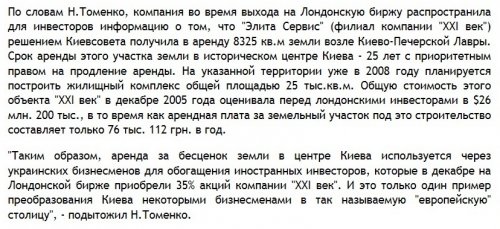
In the field of agribusiness
In 2006, the Kyiv mayor Alexander Omelchenko (Read more about him in the article by Alexander Omelchenko. Secrets of the past of Klitschko’s main rival in the Kyiv elections), with whom Partskhaladze almost kissed on the gums and easily settled matters, lost the elections to Leonid Chernovetsky, who had his own interests in Kyiv real estate. At the same time, the European Capital party created by Lev Partskhaladze also lost the elections. Over the next two years, the affairs of XXI Century CJSC were not going so brilliantly, so its confrontation with Chernovetsky led to the fact that in 2008 the European Capital party joined the Vitali Klitschko Bloc, which was being created, having won the early elections to the Kyiv City Council. From that moment, Taras Kutovoy’s political career formally began: at least, now he was listed among the ranks of the Klitschkoites.
The global financial crisis of 2008 had a direct impact on his career. Trading Ukrainian real estate and especially shares in London became unprofitable: the capitalization of ZAO XXI Vek, inflated by Kutovoy’s efforts, collapsed several times, causing the anger of small shareholders (Kutovoy had managed to sell his share of shares for 10 million dollars before the crisis). Therefore, in 2009, Taras Kutovoy left the company XXI Vek, which focused on buying up real estate from owners ruined by the crisis.
And suddenly, another unexpected move: the genius of mathematics and finance went to the fields – in the sense of working in the agricultural sector. In 2010, Taras Kutovoy made a successful deal: he exchanged the land plots he owned in Kyiv for shares in the agricultural holding JSC Company Raiz, which was suffering from the consequences of the crisis. Kutovoy became its co-owner and offered the main owner of the holding, Vitaly Tsekhmistrenko, to revive the enterprise – he agreed, and Kutovoy was appointed president of the company. However, the result of Kutovoy’s activities was the sale of Raiz in 2011 to the corporation UkrLandFarming, owned by the billionaire oligarch Oleg Bakhmatyuk. The media wrote that Taras Kutovoy managed to cheat both Tsekhmistrenko and Bakhmatyuk. In fact, he “reformed” the company using the Soros economic method: he restructured its financial part, artificially raised its value, while the company’s work practically stopped, and it faced the need for an urgent sale – and then he pushed it at an obviously inflated price, convincing Bakhmatyuk that it was a “good investment”. At the same time, he himself was not left without a “margin”: they wrote that Kutovoy sold his share of “Rise” for 5 million dollars.
In 2011, Taras Kutovoy offered his services to Privat-Agroholding and had even started working with them when Igor Kolomoisky “made inquiries” about Kutovoy and then threw him out on the street. However, Kutovoy quickly found himself another interesting job, becoming the managing director of A1 Global Holdings Limited (EDRPOU 2660886), a representative office of the investment company A1 of the Russian billionaire and owner of Alfa Group, Mikhail Fridman. For two years, Taras Kutovoy was engaged in “market research” for Fridman, and there would be nothing wrong with that if at that very time Alfa Group was not one of the five largest raiders in Ukraine and the CIS. Thus, Kutovoy played the role of an “intelligence officer” and collector of information about enterprises and facilities of interest to Alfa Group.
And judging by the fact that in 2012 Taras Kutovoy unexpectedly surfaced as the chairman of the supervisory board of the All-Ukrainian public association “Union for the Salvation of the Village”, he was also looking for “investment objects” in the Ukrainian village for “Alfa Group”. And the official biography of Taras Kutovoy states that at that time he himself acted as an “investor in Ukrainian agriculture”. What kind of investments these were was revealed later: through shell companies, Kutovoy leased agricultural lands, and then subleased them. Of course, it was difficult to do this without “anointing” the local authorities and gifting the villagers with trinkets: thus Taras Kutovoy became a “benefactor” for the town of Lokhvitsa in Poltava region, where he decided to run for people’s deputy in the 151st majoritarian district.
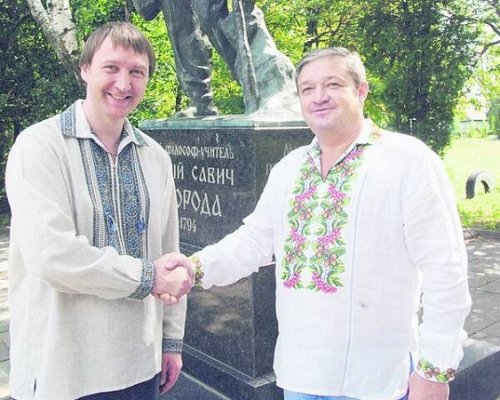
A Soros financial wunderkind from Kyiv, who had never lived in a village, dressed up in an embroidered shirt and introduced himself as an oppositionist from the Klitschko bloc. He denounced the “criminal regime” and threatened to impeach President Yanukovych, declared the need to support the Ukrainian village and Ukraine’s European choice. However, from the very beginning, the 2012 elections in Lokhvitsa were marked by scandal. It all began when local activists of the “For Fair Elections” movement began distributing newspapers and leaflets in Lokhvitsa with dirt on Taras Kutovoy. His reaction was quite nervous: at first, Kutovoy made refutations on a local TV channel, declaring that this was slander brought against him by his political enemies. Then he tried to organize an action to collect leaflets from the population in exchange for… porridge. Finally, the “oppositionist and democrat” who branded the “criminal regime” resorted to the method of banal physical force – and hired a team of strong, gloomy guys who began to persecute the activists of “For Fair Elections”. Thus, Taras Kutovoy used “titushki” a year before the well-known events in Kyiv! At the same time, it was reported that people from Kutovoy’s “support group” had previously been used during corporate raids, as well as for “conversations” with stubborn landowners.
Behind the screen of patriotism
Distribution of election promises and porridge, as well as help from “titushki” helped Taras Kutovoy win the 2012 elections with 41.25%. As required by law, Kutovoy left his job at A1 Global Holdings Limited, but at the same time his “other half” Antonina Gapchenko (now Kutovaya) became a co-founder and head of Pro Capital Investment, a part of the Pro Capital group. The company does the same thing that Taras Kutovoy himself has always done: increasing the market value of enterprises and their shares, as well as finding “good investments” for clients. It is also known that the Pro Capital group serves the interests of large agricultural holdings, including in matters of acquiring agricultural land (for now, for rent and sublease) and buying up agro-industrial enterprises.
It is interesting that Taras Kutovoy always introduces his wife as a TV presenter and analyst, not a businesswoman: Antonina really did host the program “Pro Kapital” on the “First Business Channel”. It is no less interesting that in his income statement for 2011, Kutovoy indicated only 1.2 million hryvnia as a salary for the director of “A1 Global Holdings Limited” and a modest 100 thousand hryvnia in dividends, an apartment of 103 square meters and no car. For some reason, he kept silent about the presence of a house in Kensington (a district of London) worth 6.5 million pounds.

The Kutovs’ “Khatynka” in Kensington
The image of the “savior of the village” stuck to Taras Kutovoy so much that in the Verkhovna Rada in 2012-2014 he received the position of deputy chairman of the committee on agrarian policy and land relations. However, the image alone was not enough for this: Kutovoy was promoted to lobby the interests of Ukrainian “hangar barons” and very large foreign investors, and not only Mikhail Fridman’s “Alfa Group”. Already in 2011-2012 he approached potential investors from China, Turkey and Arab countries. But the former “Soros financier” had another side to his work: using the economic potential of the Ukrainian agricultural market for financial transactions.
The events of 2014 forced Taras Kutovoy to run for office again: this time he was re-elected in the 151st district with 63% of the vote and practically without any resistance from his competitors and truth-seekers. As local Lokhvitsa oppositionists said, this happened also because this time Kutovoy’s “titushki” were dressed in camouflage uniforms of “patriots” and “ATO participants”. In addition, Taras Kutovoy became friends with the “gas workers” who extract hydrocarbons in that area (Poltava region is a gas-bearing region). The extraction brings a lot of inconvenience to local residents, and they complained to all authorities, including their deputy. Kutovoy “conned” the gullible villagers by promising them… free gas to their homes! Of course, the villagers are still waiting for what was promised, but the owners of the gas wells are now very grateful to Kutovoy for relieving social tension.
Running again as a member of Klitschko’s UDAR bloc, he joined him in the newly created Petro Poroshenko Bloc (PPB), where he became the coordinator of the UDAR cell. During 2014-2015, Taras Kutovoy distinguished himself with two initiatives. In parliament, he became the author of bill No. 2527, according to which VAT refunds are provided to those producers who are direct exporters. Critics indignantly claimed that, in the end, front companies that exported agricultural products only on paper “made money” on the VAT refunds. And after the state returned almost 37 billion hryvnias of VAT to companies, the treasury ran out of money. Well, in his new “homeland” in Poltava Oblast, Taras Kutovoy was scandalized by the story of acquiring 4,134 hectares of land for a long-term lease (49 years), which were withdrawn from the use of the companies where Kutovoy had previously worked (including “Rayz”) and transferred to his trusted persons in Lokhvitsa. They turned out to be: Grigoriy Shamritsky (head of the Lokhvitsa branch of UDAR), and “farmers” Anatoly Maiboroda and Oleg Timoshenko. Sources claimed that this trio are only front men through whom Kutovoy concentrates the leased lands in his hands.
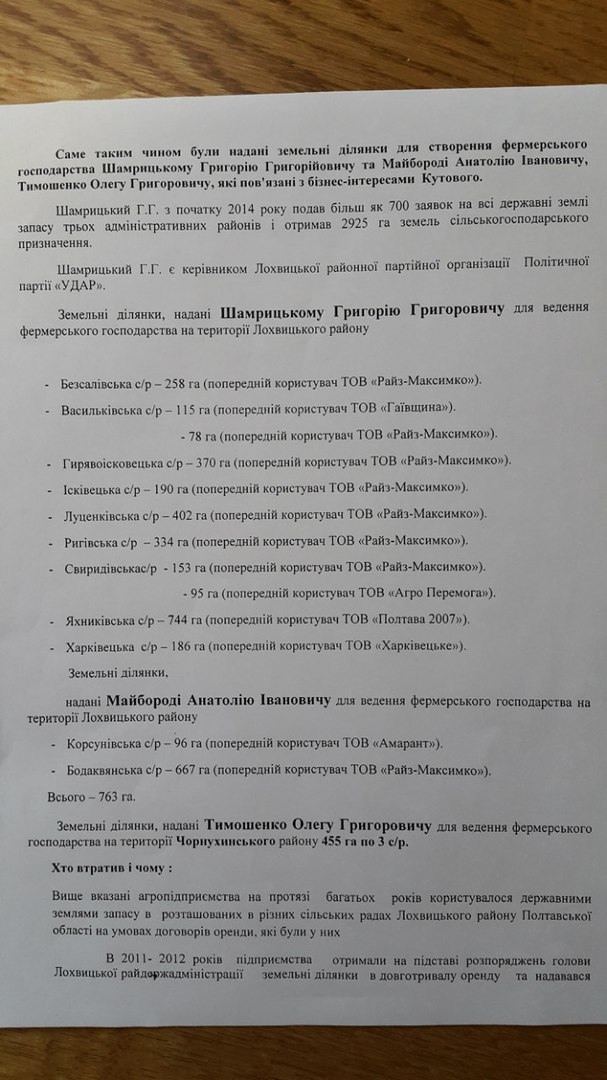
But these scandals did not prevent Taras Kutovoy from becoming the Minister of Agrarian Policy of Ukraine in the new government of Volodymyr Groysman in April 2016 (Read more about him in the article Volodymyr Groysman. Dark spots in the biography of the Speaker of the Verkhovna Rada). Considering that the third “post-Maidan” government was also a coalition, Taras Kutovoy was considered as a quota for UDAR, while noting that his weight in Klitschko’s motley team is rapidly growing. And, nevertheless, the forces promoting Kutovoy continue to remain in the shadows. This is largely due to the fact that the Ukrainian agrarian oligarchy itself does not want public fame, and its business remains the most “shadowy” and corrupt: the grain schemes of Ukrainian traders are much more intricate than the gas schemes of Firtash and Boyko (read more about them in the articles DMITRY FIRTASH. THE STORY OF THE TERNOPIL BILLIONAIRE and YURIY BOYKO – “UNTOUCHABLE»)!
As Minister of Agrarian Policy, Taras Kutovoy immediately published a program for reforming the industry called “3+5”. Despite the fact that it was written in intricate economic terms, and Taras Kutovoy presented it in a solemn patriotic atmosphere, the program was harshly criticized. Experts noted a number of strange inconsistencies in it: for example, Kutovoy advocates the fastest possible total privatization of all enterprises in the Ukrainian agricultural complex (including port elevators), which fits in well with the concept of a supporter of liberal economics. But at the same time, he speaks out against the free sale of agricultural land, considering it appropriate to lease it for a long term (49 years), as well as to turn the right to lease into a commodity that can act as bank collateral. According to experts, Minister Kutovoy simply defends the existing system of “latifundist-tenants” who are not interested in spending money on buying land at market prices, since they rent it from villagers for pennies (who do not know what to do with their shares). Moreover, at one time Taras Kutovoy personally participated in the creation of schemes for increasing the capitalization of agricultural holdings with leased lands; today his companies work according to these schemes, and he is also not interested in changing the established rules of the game. After all, the financier Kutovoy is ultimately interested in the value of shares and real estate, and not the volume of harvested crops.
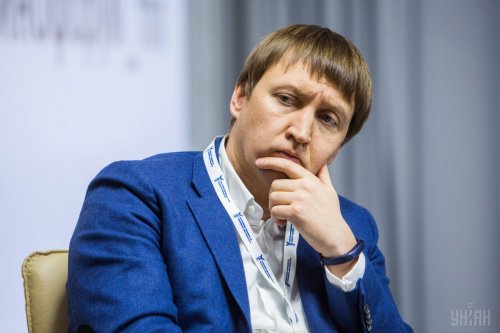
Kutovoy Taras
A flurry of criticism was also caused by the intention to privatize the State Food and Grain Corporation of Ukraine (SFGCU), which is currently the largest grain trader in the country (the export capacity of its enterprises is up to 2.5 million tons). Not only has SFGCU been deliberately incurring losses since 2014 (currently they have reached 3.9 billion hryvnia), but the current Minister of Agrarian Policy refused to reimburse it for VAT in the amount of 900 million hryvnia. Private grain oligarchs were getting their VAT refunded, but the state corporation was not. Therefore, Taras Kutovoy was directly accused of deliberately ruining SFGCU with the aim of selling it for pennies – thus, the main competitor of Kutovoy’s friends will be removed from the market.
“3+5” was also criticized as an openly proposed scam. In particular, the idea of leasing Japanese agricultural machinery for farmers is called a scheme by which the machinery will be delivered through fictitious companies (working under the protection of the minister), which will transfer the money received for it to offshore companies, leaving the state in debt to Japan. Why did some experts decide this? Apparently, Taras Kutov has already developed a certain reputation.
Meanwhile, in the summer of 2016, a fierce battle for the vacant deputy mandate unfolded in Lokhvytsia in the 151st constituency. There were rumors that, having received the ministerial portfolio, Kutovoy promised in exchange to guarantee the victory of the BPP candidate in Lokhvytsia – Oleksiy Ryabokon (he ran as an independent candidate). However, polls showed that Ryabokon was losing the race to Batkivshchyna candidate Ruslan Bohdan. And then, on the last day of candidate registration (a month before the elections), their list was replenished with 17 more nominees (there were 48 in total), including “ATO veterans” and members of “patriotic organizations”. Then there was unprecedented pressure on the local branch of Batkivshchyna, many of whose members simply left Lokhvytsia before the end of the elections. And yet, Ruslan Bohdan won – after which Kutovoy’s people could only try to declare the elections rigged by involving all the losing candidates in the protest.
In July 2016, another scandal related to Taras Kutov broke out in Odessa, where the head of the Odessa Regional Phytosanitary Inspectorate, Andriy Tofan, was caught taking a bribe of $27,000. Moreover, his appointment as minister was carried out by agreement with the BPP people’s deputy Ruslan Solvar (Read more about him in the article by Ruslan Solvar. The Overseer Families behind rail freight are still in business), who is a person close to the Presidential Administration and literally controls cargo transportation through Odessa.
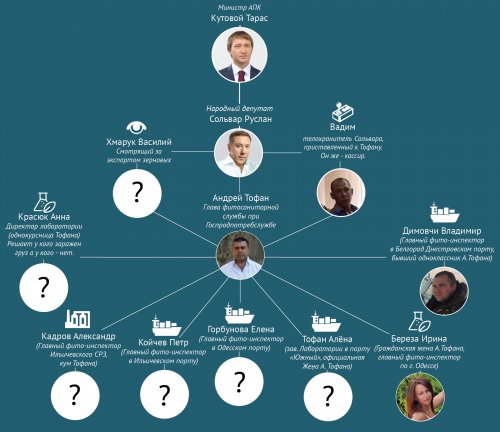
And literally two weeks after this loud scandal, another subordinate of Taras Kutovoy was caught taking a bribe in Kharkov: an official from the Ministry of Agrarian Policy demanded 150 thousand dollars from the company for assistance in winning a state tender. The minister immediately rushed to fire the arrested woman and once again stated that he intended to cleanse his department of corrupt officials. This only caused ironic grins from people who know Taras Kutovoy well…
Sergey Varis, for SKELET-info

